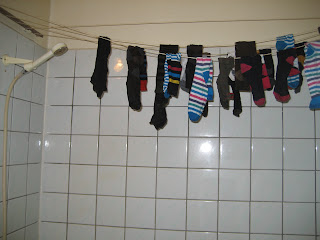When I
was preparing for my trip to Russia this year, I was working from a
few well-learned lessons after years of travel here:
-Always
carry a supply of toilet paper as you won't find any in public
bathrooms
-The
only public bathrooms are squat toilets
-Only
children are allowed to wear shorts
-Make
sure you have a bag with yourself at all times – you never know
when you'll find That Great Purchase
-Don't
talk on the metro – Russians cherish grumpy silence; plus it's rude
of you to display your full set of healthy, white teeth
What I
found when I arrived was that all of these maxims needed to be either
refined or abandoned altogether (except for the part about the
teeth).
In my
absence, Russia has undergone an enormous Westernization (i.e. people
have become more civilized and are living higher up on Maslow's
hierarchy) and Americanization (i.e. a lot more big butts from the
explosion of fastfood restaurants; so much that about a third of
Petersburgers are said to be diabetic now).
Petersburg
and Russia have changed.
I
noticed the change when I (successfully) used my ATM card to withdraw
money at the bank. The machine gave me a bill too large to use at any
store so I went to a clerk to have it changed. In the clean lobby of
the bank there was a scrolling sign that read "the customer is
always right." People took numbers and waited their turn. No more scrabbling like chickens to get the last few kernels of corn. And I got my money changed without a frown, a
groan, or a loathing look.
I
noticed the change when I went to the grocery store at the end of my
street. While booze and cookies still take up a substantial portion
of the store, there are all sorts of fresh fruits and veggies,
spices, soups, a deli and a butcher counter. There are even some
vegetarian options. Most surprisingly, when I went to check out, the
clerk said hello, offered me a bag(!) for free (!!), asked if I had a
frequent-buyer card, and even put my change directly in my hand (in
the past money always had to be put in a plastic tray on neutral
territory – you never gave or received it directly into someone's
hand). Now, some things about the clerks haven't changed. They still
insist that you produce some portion of your payment in coins, just
to make it easier for them to make change. And they still rip a notch
in the top of your receipt even though the utility of this gesture
has long passed.
I
noticed the change in the astonishing number of cafes and restaurants
(Chinese, Georgian, European, Russian. . . ). The chain кофе хаус
(Coffee House) is as common as Starbucks and there is rarely a street
that doesn't boast a sushi bar. The fad with sushi bars is puzzling,
but the Russians seem to see it as the essential indicator of a
cosmopolitan life. Interestingly, owing to undependable refrigeration
and long waiting times on loading docks, Russian-style sushi could be
the answer to the nation's weight problem. Locals take it as given
that an evening of sushi is always followed by several days of
gastrointestinal distress.
I
noticed the change in the malls that have sprouted up. These aren't
the 1990s style shops that have taken up residence inside of former
Soviet-era buildings, but actual new construction. Vast interior
spaces with sunglass huts and watch kiosks as well as nearly any
shop you can imagine: L'Occitane, Rive Gauche, Tiffany's, The Gap, a
"certified" Apple Store, Swarovski, The Body Shop,
Desigual, H&M, Zara, Adidas, even a dreadful Tommy Hilfiger.
But
the real surprise about the mall for me came when I got to the food
court on the top floor (next to the movie theater playing "Men
in Black III"). Let's explore the dining options in pictures:
 |
| I love the marketing of this place. It's a meat-only restaurant. The name sounds like Mesopotamia, but they've changed the first syllable to "myaso" (meat). |
 |
| "Only Spoons," a soup restaurant, will be opening in this space soon. Sounds gimmicky to me. Maybe it will turn out to the be Russian equivalent of the U.S. cupcake craze. |
 |
| Our cute like bliny kiosk has turned into a mall store. |
And
finally I noticed the change in the area around the Chajka. In what
seemed like the blink of an eye, the squalid dump had turned into a
thicket of twenty-story apartment buildings and shops, all looking
out onto the new passenger terminal in the Gulf of Finland where
cruise ships dock.
 |
| Now my window at the Chajka looks out on this. |
 |
| This gives a little more perspective. The Chajka is a sad, little Soviet building next to its posh neighbors. |
And here are some of the signs of modernity around the Chajka
 |
| Weird Italian restaurant blow-up guy |





































